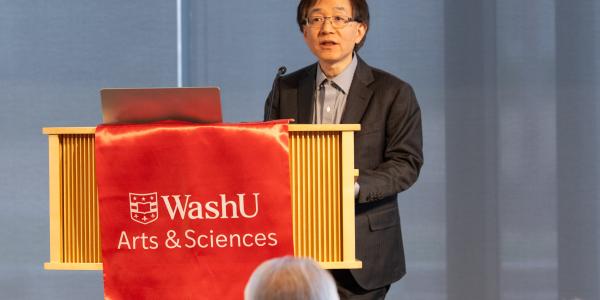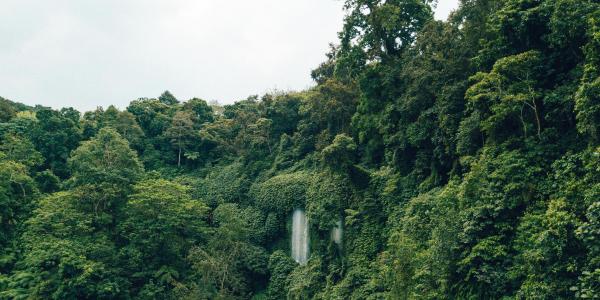Senior Julian Cauzae McCall discusses the importance of spreading climate change awareness in an evolving media landscape.
Julian Cauzae will graduate this May with a bachelor’s degree in environmental analysis and international affairs. As a journalist who has written editorials for the Miami Herald and the Riverfront Times, he aspires to make useful environmental information accessible to non-academic audiences.

Cauzae talked with the Ampersand about how social media can play an important role in encouraging informed climate action.
How has your perspective on climate change evolved since you arrived at WashU?
When I came to WashU, my understanding of climate change was the same as anyone else’s — I knew that it was real and that the situation wasn’t looking good, but not much more than that. But majoring in environmental analysis gave me a completely different perspective on climate change and its relationship to everything: human development, international relations, religion, and almost anything else you can think of.
The knowledge gap between what I knew then and what I know now is absurd. That’s probably the case with any major you choose. But this is the planet. I shouldn't have to go to an elite university to have a baseline understanding of one of the biggest threats facing life on this planet.
Now my guiding principle is to make learning about climate change accessible to as many people as possible.
What inspired you to start using social media as a tool for climate change communication?
One day, I took a break from writing about climate change for WUPR and thought to myself, “OK, when I finish this article, I know that my mom is going to read it. I know that my dad is going to read it. But unless someone happens to flip through a copy of the magazine, that’s about it.”
I was scrolling through TikTok, watching videos with millions of views, when I had an idea. I lifted my phone, hit record, and just started talking about what I was writing. If that first TikTok had reached even one person who wasn’t my mom or my dad, I would have been happy. It ended up getting about 16,000 views.

What allows TikTok to be a successful vehicle for sharing information?
Given how people work and live these days, there’s often no opportunity to sit down and read a bunch of articles about climate change every day. But if you’re just scrolling through social media during your lunch break, you can learn something from a short video that piques your interest.
My general strategy is to grab people’s attention with new perspectives on current events, like the Willow Project or COP27. Then I just approach them as intelligent people wanting to learn something new. I really try to honor my audience’s ability to understand the world around them.
How has your religion and politics minor impacted your understanding of climate change?
The religion and politics minor has helped me understand how our relationship with the environment manifests from a specific mythology and worldview. The idea of nature being separate from humanity is not a neutral or natural idea; it's a particular idea with consequences that we see in our lives. That’s why I love the sort of decentralized journalism you see on social media — people can bring new perspectives and worldviews into the conversation. Instead of saying that politicians are evil for supporting another oil pipeline or offshore drilling project, we can analyze and critique the rationale behind their actions.
During your time at WashU, you have helped lead the Washington University Climate Change Program, the Student Environmental Council, and interdisciplinary student forums on climate change. What is your advice to people who want to get more involved in climate action?
People who care about climate change tend to think they’re in the minority, but they’re not. There are climate organizations everywhere. My message to people on TikTok is to get out into your local community and address the specific needs of that community.
My advice to freshmen is to really, really try to step outside of campus. At WashU, you have such a wonderful opportunity to make an impact in the city of St. Louis. It’s really empowering to be able to say, “I’m young, but I’m still doing something.”




